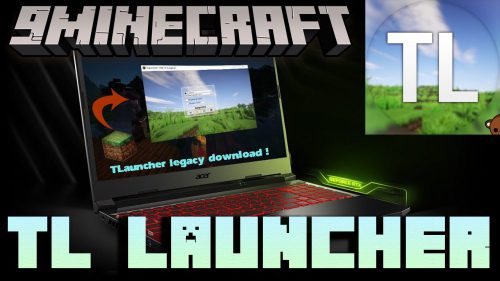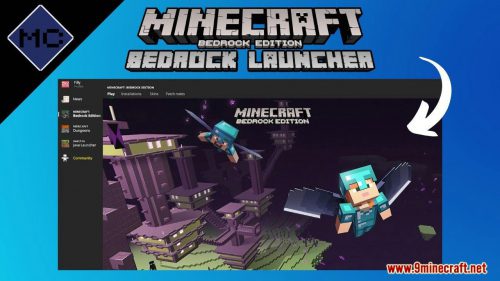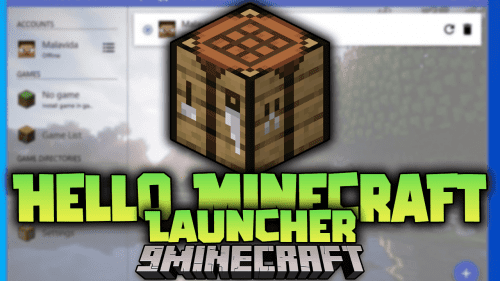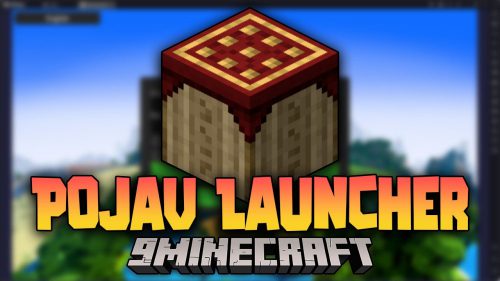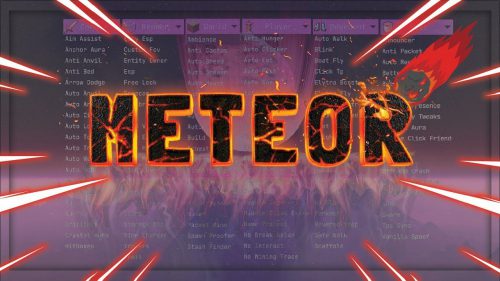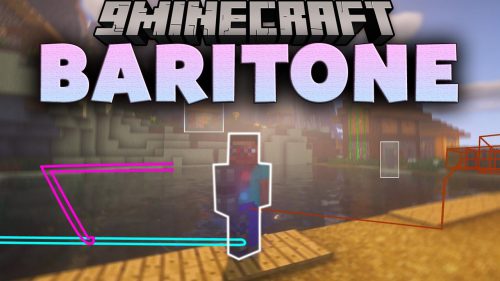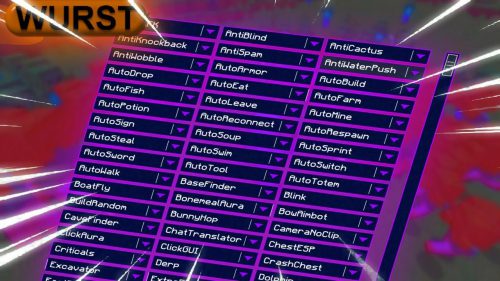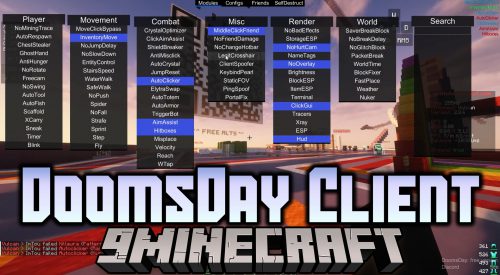NBT Tags for Skeleton Horse – Wiki Guide
 130
130
 0
0
 January 4, 2024
January 4, 2024
This Minecraft tutorial explains the NBT tags (formerly called data tags) that you can use for a skeleton horse in Minecraft Java Edition (PC/Mac) 1.16, 1.17, 1.18, 1.19 and 1.20.
TIP: If you are not running Minecraft Java Edition (PC/Mac) 1.16/1.17/1.18/1.19/1.20, find NBT tags for skeleton horse in another version of Minecraft:
- Java Edition (PC/Mac) 1.14/1.15
- Java Edition (PC/Mac) 1.11/1.12
(If you are running Minecraft Java Edition (PC/Mac) 1.10 or older, use the EntityHorse data tags for a skeleton horse)
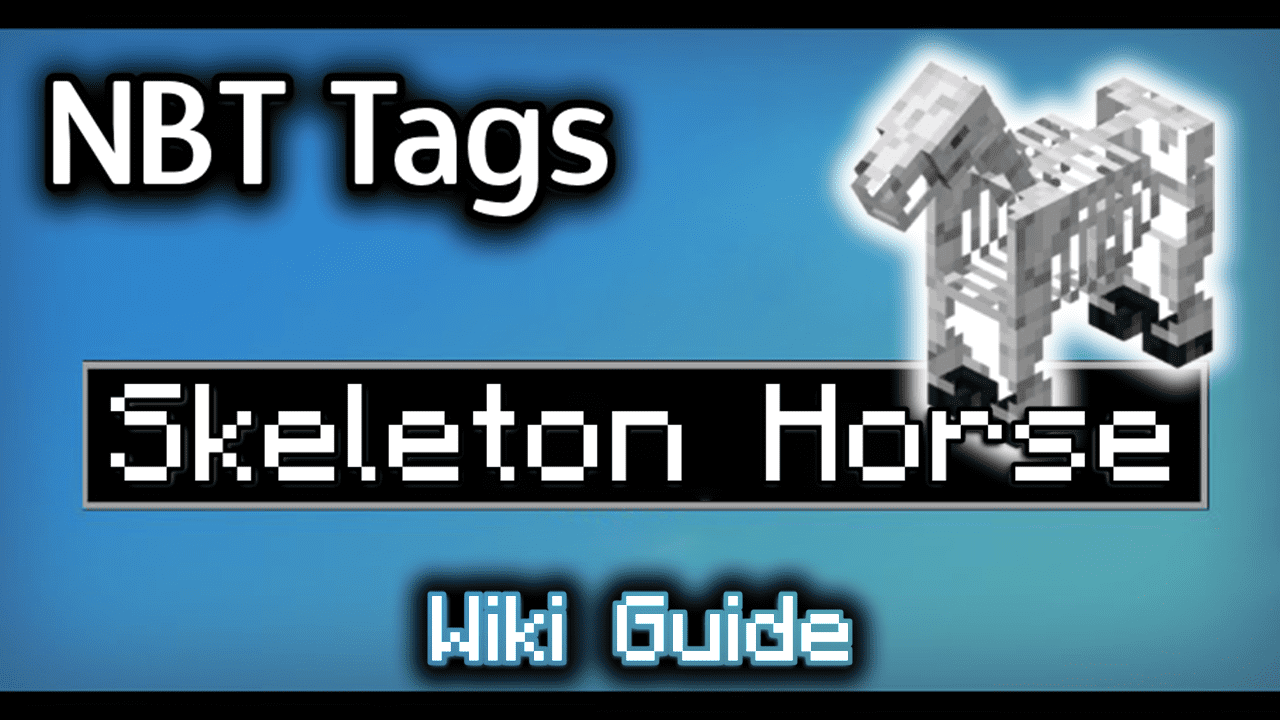
Background
In Minecraft Java Edition 1.16, 1.17, 1.18, 1.19 and 1.20, the entity value for a skeleton horse is skeleton_horse. The skeleton_horse entity has a unique set of data tags that can be used in Minecraft commands such as: /summon and /data.
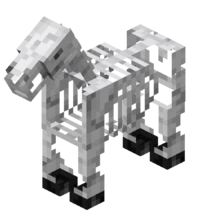
What are NBT tags (formerly called Data Tags)?
NBT tags allow you to set certain properties of an entity (such as skeleton_horse). The NBT tag is always surrounded in {} such as {Tame:1}. If there is more than one NBT tag used in a game command, the NBT tags are separated by a comma such as {Tame:1, CustomName:”\”Fred\””}.
List of NBT Tags
Here is a list of the NBT tags that you can use for skeleton_horse in Minecraft Java Edition (PC/Mac) 1.16, 1.17, 1.18, 1.19 and 1.20:
| NBT Tag | Value (Description) | Works With |
|---|---|---|
| Tame | 0 (The skeleton horse is wild) 1 (The skeleton horse is tame) Example |
/summon /data |
| SaddleItem |
If the skeleton horse is wearing a saddle, it is used to specify the Minecraft id for the saddle and number of saddles worn by the skeleton horse Example |
/summon /data |
| Temper |
number (The temper of the skeleton horse which is a number from 0 to 100. The higher the number, the easier it is to tame the skeleton horse.) Example |
/summon /data |
| InLove |
ticks (The number of game ticks that the skeleton horse is in love mode and will try to breed with another skeleton horse) Example |
/summon /data |
| Bred |
0 (The skeleton horse has not bred) Example |
/summon /data |
| Age |
ticks (The age of the skeleton horse in game ticks. Use 0 or higher for an adult. Use a negative number such as -25000 for a baby.) Example |
/summon /data |
| ForcedAge |
ticks (When a baby skeleton horse matures, the Age data tag will be set to ForcedAged. However, there have been bugs with this data tag so it may not work properly.) Example |
/summon /data |
| EatingHaystack |
0 (The skeleton horse is standing normally) Example |
/summon /data |
| Leash |
Indicates the coordinates of the fence that the skeleton horse is leashed to. Example |
/summon /data |
| SkeletonTrap |
0 (The skeleton horse becomes a skeleton trap) Example |
/summon /data |
| SkeletonTrapTime |
ticks (The number of game ticks that the skeleton trap has not been triggered. A skeleton trap will only trigger when a player is within 10 blocks of the trap. Once the SkeletonTrapTime reaches 18000 ticks, the untripped skeleton trap will despawn) Example |
/summon /data |
| CustomName |
name (The name to assign to the skeleton horse) Example |
/summon /data |
| Health |
number (The number of health points the skeleton horse has) Example |
/summon /data |
| AbsorptionAmount |
number (The number of absorption health points the skeleton horse has) Example |
/summon /data |
| Invulnerable |
0 (The skeleton horse will take damage like normal) Example |
/summon /data |
| PersistenceRequired |
0 (The skeleton horse will despawn naturally) Example |
/summon /data |
| NoAI |
0 (The skeleton horse will have artificial intelligence and will move/behave like normal) Example |
/summon /data |
| Silent |
0 (The skeleton horse will make its usual noises in the game) Example |
/summon /data |
| Fire |
ticks (The number of game ticks until the skeleton horse is no longer on fire – there are 20 ticks in a second) Example |
/summon /data |
| PortalCooldown |
ticks (The number of game ticks until the skeleton horse can go through a portal again – there are 20 ticks in a second) Example |
/summon /data |
| Air |
ticks (The number of game ticks the skeleton horse has air left for) Example |
/summon /data |
| id |
skeleton_horse (The entity value used to represent a skeleton horse in the EntityTag or Passengers tag) Example |
/summon /give |
| Passengers |
The mob that is riding on the skeleton horse. Use the entity value for the passenger mob Example of skeleton as passenger |
/summon /data |
NBT Tag Examples
To summon a baby skeleton horse:
/summon skeleton_horse ~ ~ ~ {Age:-25000}
To summon a tame skeleton horse wearing a saddle:
/summon skeleton_horse ~ ~ ~ {Tame:1, SaddleItem:{id:saddle,Count:1}}
Target Selectors
Before we finish discussing data tags, let’s quickly explore how to use the @e target selector. The @e target selector allows you to target entities in your commands. If you use the type=skeleton_horse value, you can target skeleton horses:
@e[type=skeleton_horse]
Target Selector Examples
To change the nearest skeleton horse to a baby skeleton horse:
/data merge entity @e[type=skeleton_horse,limit=1,sort=nearest] {Age:-25000}
To kill all skeleton horses:
/kill @e[type=skeleton_horse]
Next, learn how to use the game commands in Minecraft.
Command Examples
Here are some game command examples for a skeleton horse in Minecraft:


